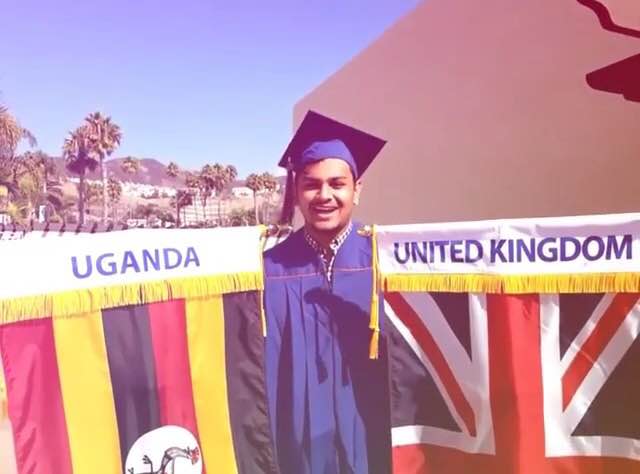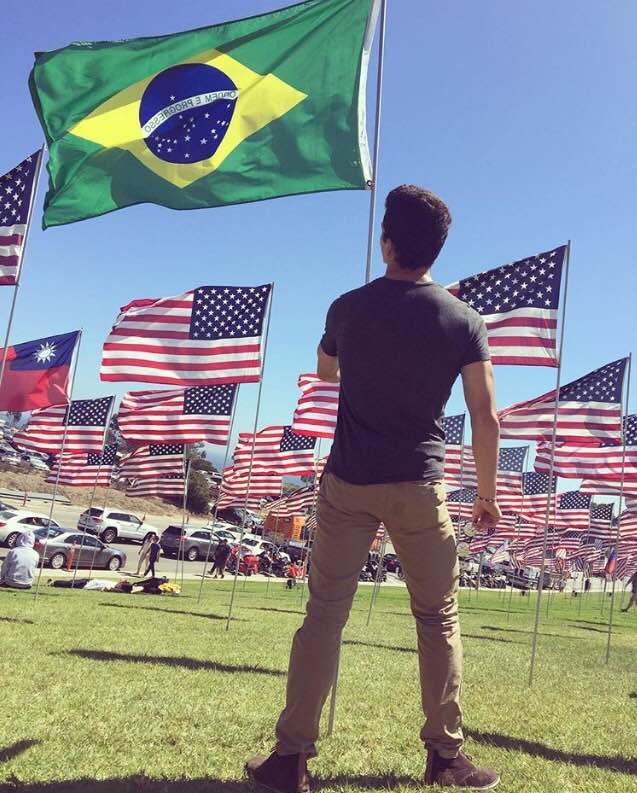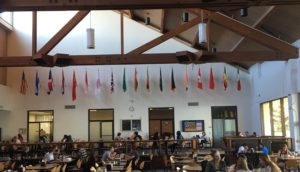
When fall hits, Sahil Halai, an Ugandan international student, walks around Malibu in a heavy winter jacket since he is not use to any weather besides Uganda’s warm and humid temperatures.
That’s just one of the cultural differences Halai has faced studying at Pepperdine as one of 346 international students on campus.
“Studying in the United States has definitely been very different then studying in Uganda,” Halai said. “I think every international student can agree that there’s many different challenges we all have to face throughout our time here which adds to the pressure of college.”
International students come to Pepperdine for a variety of reasons, including a great education and new opportunities. International students, however, sometimes struggle at Pepperdine because of cultural differences, language barriers, lack of background for required general education classes that are American or Western centric, and lack of biblical knowledge for required religion classes.
“I have struggled a lot in some courses,” said Vallerie Chen, senior business administration major and international student from China. “I have to study so much more in classes such as the humanities GE then my classes related to my major and I still don’t do as well.”

International student statistics
For fall 2016, 1,820 international students applied, 501 were admitted and 98 enrolled. This brings the current international student population to 346 undergraduates out of the total 3,388 undergraduates, according to Pepperdine’s admission fast facts webpage.
Some 10 percent of Pepperdine’s student body is made up of international students from more than 80 countries. The national average for international students is only 5 percent of the student body, according to Pepperdine’s undergraduate admission page.
Brooke Cutler, director of the Office of International Student Services, did not return multiple requests for comment over a two-month period.
The majority of the international students come from China, with the next majority from Indonesia, and then Thailand, according to Pepperdine’s website.
“Overall regarding international students, students from Europe tend to adjust better,” Dennis Yu, junior international office worker, said. “Chinese and Asian students still adjust it just takes longer because it is such a big culture jump.”
Many international students said they knew the majority of their life that they wanted to come to the U.S. after high school to pursue further education.
“I came to the U.S. because my school, The British school of San Paulo, naturally prepared its students to go abroad,” Anthony Wells, senior broadcast journalism major and international student from Brazil, said. “Also my dad is American so of course my preference would be the U.S.”

Culture change
For many international students, the culture and way of life here is very different from home.
“The food here is very different,” said Fillippo Margheritini, a freshman business administration and international student from Italy. “In Italy we usually eat dinner around 8:30 to 9:30 p.m., so I am not use to eating so early.”
History Professor Sharyl Corrado said each international student adjusts to this culture change in different ways.
“Based on students I’ve talked to, it’s mixed,” Corrado said. “Some love it here, and do really well. Others miss their homes and family, struggle with their classes, have trouble fitting in or making friends.”
Halai said that although some of his friends faced a culture shock, he did not and that he is very happy with his decision to attend Pepperdine.
“Since being at Pepperdine, I have learned so much about myself and life,” Halai said. “Pepperdine has done a great job making me feel a part of the community.”
Another major change of the culture is the language. Halai shared how his high school was an international school so English was never an issue.
“I was very fortunate to have a clear understanding of English before attending Pepperdine,” Halai said. “I now have no concern about the change of language affecting my studies.”
Juan Yepez, a sophomore economics major and international student from Ecuador, was also fortunate enough to have a clear understanding of English before reaching college.
“I was able to pick up English in two years,” Yepez said. “Thankfully, since being at Pepperdine I have been able to understand all my classes very clearly with no problems even though I only learned English three and a half years ago.”
Other international students were not as successful in picking up English, therefore, they have been struggling in some classes. Audrey Miotto, a public relations major and international student from Italy, shared how it has been a rough transition to the United States.
“I was struggling to pick up the language especially in certain classes where they used very specific vocab,” Miotto said. “I would often ask my friends or the person next to me to explain the meaning of certain things.”
Background of history
International students don’t have the same history background as domestic students do, causing them to struggle in humanities courses, American history and the political science GE.
“Some classes I have found I have to study a lot more than other students,” Yepez said. “Since English is my second language it makes some things much more difficult.”
Corrado has taught humanities on campus for seven years. Corrado said many of her international students choose to come in for extra help when they are struggling.
“For those who struggle with language or don’t have the cultural background that American students have, they may benefit from extra tutoring,” Corrado said. “Sometimes they will bring written assignments to me to look at before they submit them, just to make sure they’re on track and they will also sometimes come in after lecture to ask for clarification on things they didn’t understand.”
Kendra Killpatrick, a Pepperdine professor of mathematics and an associate dean, said she is working on expanding tutoring options for GEs to help all students, including international ones.
“We currently offer tutoring through the Seaver Student Success Center for most of the required GE courses,” Killpatrick said. “We will offer tutoring for all 100 and 200 level GE courses by fall 2017.”
Professor Betty Dillon works with international students in various classes including the freshman seminar American culture and language that is designed for international students. She also teaches English 100, an English class for those not yet ready for the general education requirement English 101.
“Each international student is different,” Dillon said. “There’s no stereotype for how they perform.”
Pepperdine’s Christian values
Pepperdine is a Christian school affiliated with the Churches of Christ, but roughly two thirds of the international students that attend either do not have any religious affiliation or are undeclared. The other third are primarily scattered over several Christian denominations with a smattering of Buddhists, Muslims and Hindus.
“I know most people take into consideration that Pepperdine is a Christian school but I really didn’t,” said Liam Labrooy, a freshman public relations major and international student from the Phillipines. “I respect others beliefs, and as long as the school wasn’t pushing religion onto me I didn’t care much about it being Christian.”
Of the international students interviewed, all agreed with Labrooy about being indifferent to Pepperdine’s Christian mission.
Chen said she did not know as much about the religious aspect of Pepperdine before attending. She is not sure if she would have come if she did, as she and the majority of other international students had no prior biblical knowledge, causing them to struggle in the mandatory religion classes.
“I am not religious,” Chen said. “I didn’t know about the three religion classes I would have to take here and if I did I might not have attended Pepperdine because I have no background for the class so it is really hard for me to do good.”
Pooja Shah, a first-year grad student and international student from Uganda, also said religion was not an impact on her decision to attend Pepperdine.
“Even though I am Hindu I did not care much that Pepperdine was a Christian school,” Shah said. “The program for a master’s of global business and science here at Pepperdine is great and that is all I really cared about.”
Long way from home
International students are a very far way from home. This distance affects each student in a different way.
“Truthfully, I have not been home sick at all,” Miotto said. “I didn’t expect myself to be so I am glad I love it here. It’s made the transition to college easier than it would have been if I was very homesick.”
Other international students, such as Yepez, love it here but do miss their home country.
“For the first few months I missed Ecuador a lot,” Yepez said. “It was really hard on me being so far. Over time, I learned to really love it here but Ecuador will always be close to my heart.”
Doug Liu, freshman international student from China and undeclared major, shared how the different food here has made him at times homesick.
“The food here is very different than in China,” Liu said. “The Chinese food in the United States doesn’t even compare to the real Chinese food back home. The difference makes me miss home a lot more.”
Pepperdine hosts a variety of different events for the students in hope of them feeling more comfortable studying abroad. Liu shared how he was very pleased with how much Pepperdine went out of their way to help the international students.
“Pepperdine helped a lot more than most other colleges in helping us feel acquainted with the school and the states,” Liu said. “They hosted a separate international student orientation along with hosting a dinner and other events such as a baseball game just for us.”
Domestic students view
All of the U.S. students interviewed agreed that the large amount of international students on campus is a positive experience.
“I think it is awesome that Pepperdine attracts so many international students,” James Moore, freshman film major from Vermont, said. “I have met people from around the world and have learned so much about others cultures and ways of life that has opened my eyes to a whole new world.”
Michelle Madsen, senior organizational communication major from Ventura, said friendships with international students happen naturally.
“I don’t try to become friends with international students just because they are international,” Madsen said. “They become true friends, which turns into learning about them and their culture, and I think that is how it is for many U.S. students here.”
Gabi Veselik completed this story as part of Dr. Christina Littlefield’s fall 2016 Jour 241 class.



